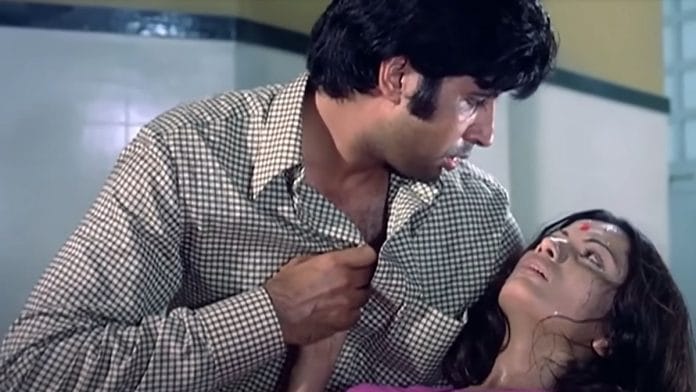By 1976, Amitabh Bachchan had dethroned Rajesh Khanna as the ‘superstar’ with hits such as Deewar and Sholay. But even as he acquired the term of ‘angry young man’, he did films such as Kabhie Kabhie and Adalat, where his characters changed as they aged.
Despite being one of the biggest blockbusters of 1977, Adalat is often not counted among his iconic portrayals in the ’70s. This, even as Bachchan showcased a powerful performance in dual roles as father Dharma and son Raju. Directed by Narinder Bedi, the film captivated audiences with its thrilling screenplay and performances.
As Dharma, Bachchan played a simple farmer living in the hinterland with his wife Radha (Waheeda Rehman) and younger sister Laxmi (Heena Kausar). The character struggles to make ends meet as he toils on his sparse fields. He has a son called Raju. To earn extra money, he takes three tourists, Ajit (Anwar Hussain), Sujit (Sujit Kumar), and Suresh on a tiger shooting expedition, where he also saves them from a tiger. Ajit decides to reward Dharma by promising a job in the city if he ever decides to shift. Dharma eventually moves to Mumbai and starts working for him.
It turns out to be the beginning of a terrible patch of life, as Ajit tricks Dharma into signing ownership documents of Ajit’s illegal business. Dharma is arrested and, unable to prove his innocence in court, is sentenced to 18 months of incarceration. He is further traumatised when his pregnant wife suffers an accident, losing the baby, and his sister dies by suicide after being raped by Sujit.
Dharma then kills off the three, after exacting a confession for their crimes and illegally taking their money. He makes their deaths look like accidents. In order to keep his son Raju away from his new life of crime, he sends him to London.
Simple farmer to cold revenger
The revenge drama stands almost entirely on the broad, able shoulders of Bachchan. Everyone else just supports him as he delivers one of his finest performances as a young actor. His transformation from a simple hardworking farmer to a silent, suffering victim in the bad city to a man exacting his revenge in a cold, calculated manner is phenomenal. His flamboyant gestures change; he begins to stand with his arms crossed and shoulders tense, no longer the man who believed in the goodness of the world and its people.
As an old man too, despite a terrible wig, he has a distinctive body language, authoritative with the wealth he has now accumulated, but slower as age has caught up with him. As Raju, Bachchan exudes easy charm and suaveness. The actor was nominated for the Filmfare award, though he lost out to Sanjeev Kumar for his performance in Yehi Hai Zindagi.
Kader Khan, who plays Inspector Khan, stands out in his limited role. He portrays an honest cop without exaggerated mannerisms or flourish, choosing instead a quiet dignity. In the scenes he shares with Bachchan, he holds his own.
When Inspector Khan confronts Dharma over Sujit’s murder, there are no screaming matches, just quiet defiance on Bachchan’s face and sympathy mixed with authority on Khan’s countenance. Even later, as he reminds Dharma of his sins, Khan does not mince his words.
“If you want to live in this society, you must learn to respect its laws. You can’t make your own set of rules and stay apart,” he tells Dharma.
But by then, it’s too late. To fulfil the film’s moral code, Dharma too must face his sins and pay for them. He eventually faces off with Ajit, who has managed to survive and is back for revenge, and gets shot in the ensuing gunfire.
Also read: Barsaat ki Raat was a rain-soaked romance. It had a qawwali that Shah Rukh Khan loves
Similarities with ‘Andha Kanoon’
The film’s name may be Adalat, but there are not many scenes filmed within a courtroom—the action takes place outside of it. The title merely refers to the false case which shapes the course of Dharma’s life. In a way, the commentary on the limitations of the legal system is similar to Andha Kanoon (1983), which has Bachchan in a cameo role. In Andha Kanoon too, his character is exploited, and he exacts revenge after the death of his wife and young daughter.
Adalat heralds what was to become a problematic trope in the ’80s—the rape of the hero’s sister or partner to push the narrative forward. While the filmmaker opts out of a graphic or sensationalised portrayal of sexual assault, he does take the easy way out in showing Laxmi’s rape and eventual suicide as the catalyst that pushes Dharma to the brink.
This would later become the trope for ‘hit movies’, especially in Insaaf ka Tarazu (1980), Mera Faisla (1981), and Ankush (1986).
(Edited by Prasanna Bachchhav)






